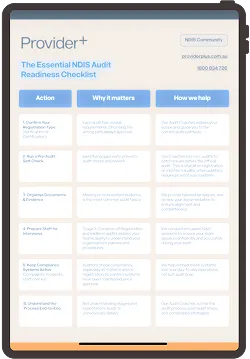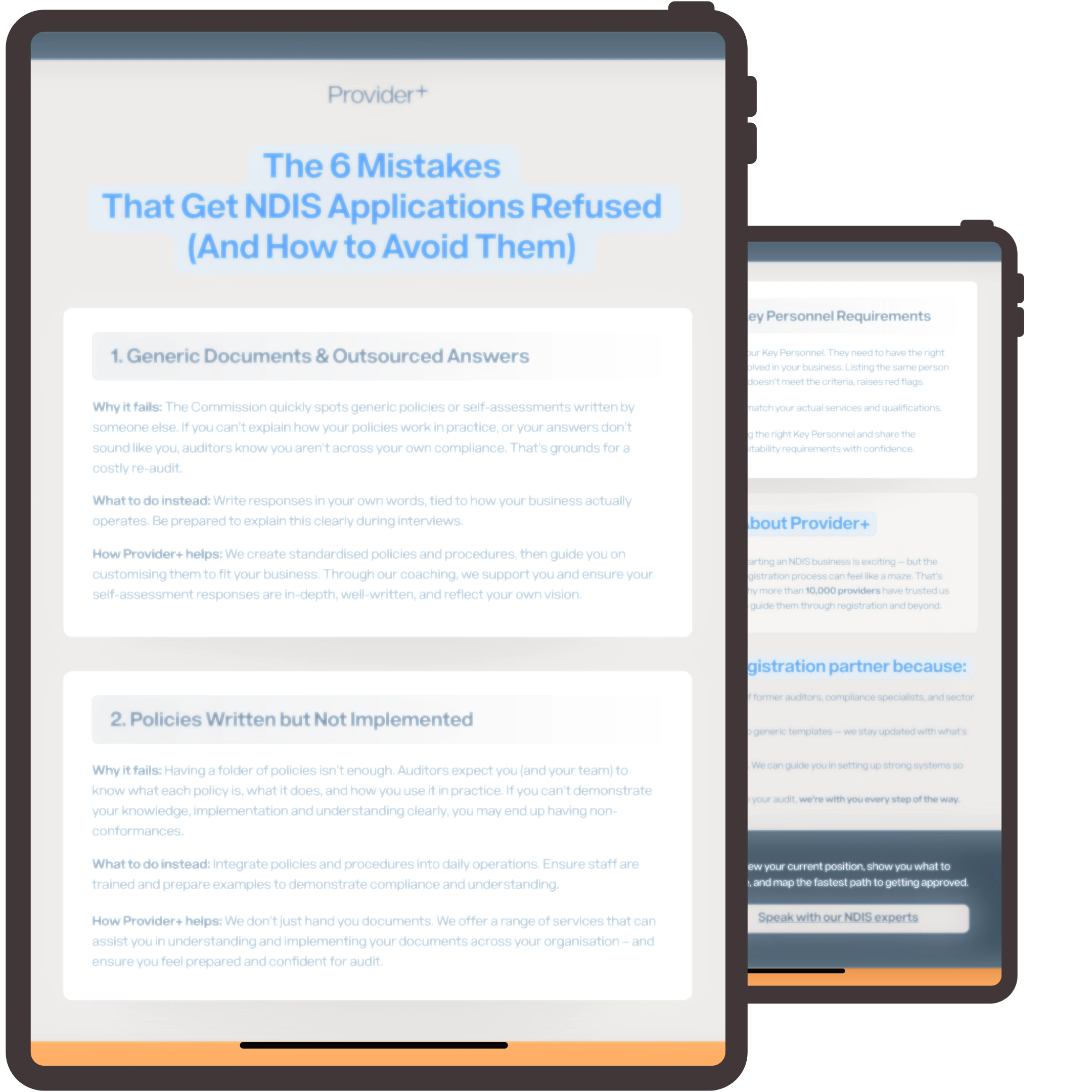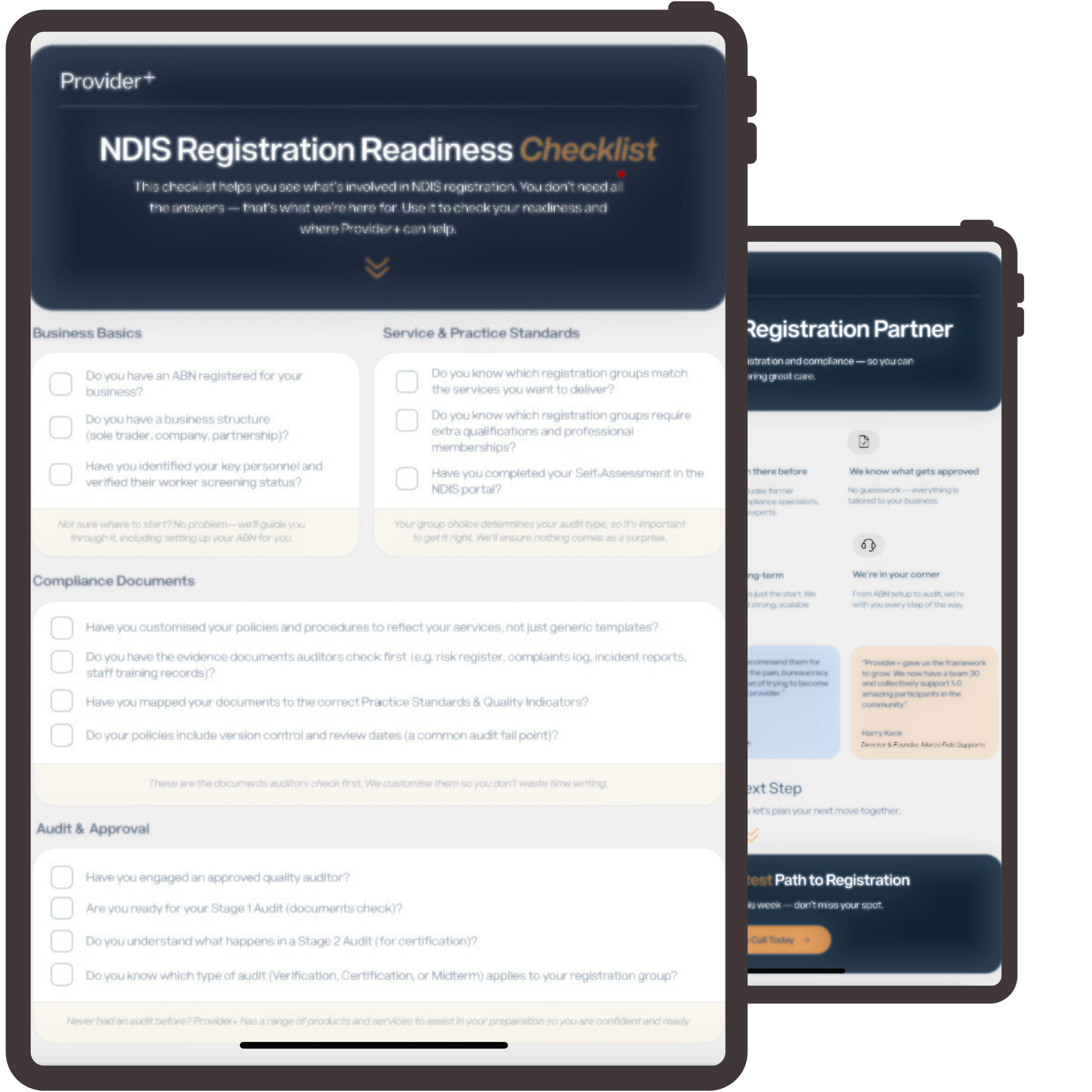NDIS Incident Reporting – Guide for NDIS Providers
NDIS Incident Reporting – Guide for NDIS Providers
Effective incident management is a critical part of the NDIS Commission’s safeguarding framework to minimise the risk of harm to people with disability, protect their right to be safe and empower them with choice and control over their lives, within the context of supports and services they receive.
All NDIS Providers have an obligation to manage incidents effectively. They must have an incident management system in place to record and manage incidents related to providing NDIS supports and services to people with disability.
And if you are a registered provider, you have the additional obligation to appropriately manage reportable incidents that have or are alleged to have had occurred.
What is an NDIS ‘reportable incident’ and when must I report it?
NDIS reportable incidents are a subset of overall incidents. The NDIS Commission classifies them as follows:
Immediate Notification (within 24 hours of a registered NDIS provider becoming aware of incident) includes:
- death of a person with disability;
- serious injury of a person with disability;
- abuse or neglect of a person with disability;
- unlawful sexual or physical contact with, or assault of; a person with disability; and
- sexual misconduct against, or in the presence of, a person with disability, including grooming of the person for sexual activity.
5-Day Notification (within five business days of a registered NDIS provider becoming aware of incident) includes:
- use of a restrictive practice that is unauthorised by your state or territory, or does not follow a behaviour support plan for the person with disability;
- NOTE: If the restrictive practice incident has resulted in harm to the person with disability, it must be reported within 24 hours (i.e. Immediate Notification);
- follow up information and actions since Immediate Notification.
What do I need to do?
If you are a registered provider, you must notify the NDIS Commission of all reportable incidents. This is in addition to incidents you have recorded and responded to within your own internal incident management system.
And remember, reportable incidents include ‘near misses’ that are potentially harmful — and it also includes complications, accidents and side-effects.
Identifying a reportable incident
Has an incident or ‘near miss’ with potential to cause harm to the client occurred in connection with the provision of NDIS supports or services you have delivered to the participant? If the answer is ‘yes’, it is reportable.
Ensuring safety and wellbeing of the client
Take any required action(s) to ensure the immediate health and safety needs of the participant. This may involve phoning emergency services on Triple Zero (000), or for non-critical medical events, it may involve contacting the participant’s GP in business hours. It will also involve contacting the family/alternate decision-maker/advocate.
Communication, Documentation and Record-keeping
Remember — it is important to keep the communication channels open with relevant stakeholders throughout the process. This includes family/alternate decision-maker/advocate and also other service providers, including the GP and allied health.
Complete and submit relevant reportable incident forms via PRODA (see below). Make sure you document clear and accurate details of the incident, action(s) and outcomes in the participant’s file and update their Support Plan and any other plans as required.
A step-by-step Guide to Completing NDIS Reportable Incident Reporting
1 Make sure you have the following reporting roles in place:
- Approved Reportable Incident Notifier to create the form ready for approval;
- Approved Reportable Incident Approver to approve the form and submit it to the NDIS Commission via PRODA.
2 Log into your PRODA account, click on the ‘My Reportable Incidents’ page and complete an Immediate Notification Form and submit it within 24 hours of becoming aware of the incident.
3 Make sure all information is included, such as:
- your organisation’s name and contact details and those of the person making the notification;
- a description of the reportable incident;
- description of the impact on, or harm caused to the client;
- immediate actions taken in response to the reportable incident, including actions taken to ensure the health, safety and wellbeing of the client, and whether the incident has been reported to police or any other body;
- client’s NDIS participant number and their name, age, date of birth and address;
- time, date and place at which the incident occurred, if known;
- names and contact details of other people involved in the reportable incident;
- location of the client and alleged perpetrator, if known;
- explanation of when and how harm, risk of harm, abuse or neglect was discovered and by whom;
- any other information required by the Commissioner.
Note: A registered NDIS provider is not required to obtain or notify the Commissioner of certain information if obtaining the information would, or could reasonably be expected to, prejudice the conduct of a criminal investigation, or expose a client to a risk of harm.
4 If, within 24 hours after you became aware the incident occurred, you do not have the information required in the last four bullet points above, you can provide this information within 5 business days.
5 Complete the 5-Day Notification Form via PRODA within five days of becoming aware of the incident. This provides additional information, such as names of witnesses, actions taken since the Immediate Notification and proposed further actions to be taken in response to the reportable incident.
Note: For an unauthorised restrictive practice, you only need to complete the 5-day Notification form, not the Immediate Notification Form. Except if the incident has resulted in harm to the person with disability, in which case it must be reported within 24 hours with the Immediate Notification Form.
Note: If your state or territory does not have an authorisation process in relation to the use of restrictive practice, its use is not a reportable incident as long as the use is in accordance with a behaviour support plan.
6 Complete the Final Report (if requested by the NDIS Commission) by the date advised by the Commission in the email request they send.
As part of your policy pack subscription, you receive comprehensive policies and procedures covering your incident management requirements plus associated forms and templates to ensure you remain compliant.
References:
NDIS (Incident Management and Reportable Incidents) Rules 2018
NDIS Commission: Incident Management and Reportable Incidents
NDIS Commission: Reportable Incidents - Detailed Guidance for Registered NDIS Providers








